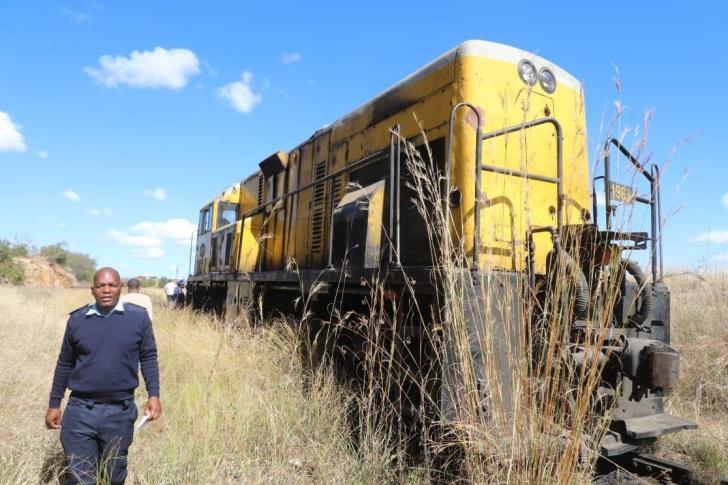News / National
Zimbabwe railways revival is long overdue
06 Jun 2025 at 11:07hrs |
0 Views

For decades, the National Railways of Zimbabwe (NRZ) has been a shadow of its former self, crippled by chronic underinvestment, mismanagement, and neglect. Despite its critical role in the country's economy, the NRZ's revival remains one of Zimbabwe's most urgent yet overlooked priorities. The continued failure to restore the railway network to full capacity is costing businesses billions in avoidable transport expenses, while the overreliance on road haulage is accelerating the deterioration of the nation's road infrastructure. It is imperative that the government treats NRZ as a strategic asset and fast-tracks its rehabilitation - not next year, not in the next budget cycle, but now.
Operating at only a fraction of its capacity, NRZ's inefficiency has forced industries to shift to road transport, which is significantly more expensive. Transport costs now account for a substantial portion of product prices in Zimbabwe, undermining the competitiveness of local goods both domestically and in regional markets.
Key economic sectors such as mining, agriculture, and manufacturing bear the brunt of this challenge. Rail transport of minerals, grains, and fertilizers is up to 80% cheaper than road haulage, yet companies are left with no choice but to rely heavily on trucks. This shift has not only inflated logistics costs but also intensified wear and tear on roads, with major routes like the Bulawayo-Victoria Falls corridor showing visible signs of strain from excessive heavy truck traffic. Investing in rail infrastructure, therefore, offers dual benefits: lowering long-term road maintenance expenses and reducing overall logistics costs.
Despite the urgency, efforts to revive the NRZ have been slow and inconsistent. Over the years, numerous proposals-including public-private partnerships and foreign investment deals-have been floated but remain stalled by bureaucratic delays and policy uncertainty. A notable setback was the collapse of the 2017 agreement with the Diaspora Infrastructure Development Group and Transnet, mired in controversy and unresolved issues. Other potential investors have been discouraged by the absence of a clear and consistent national strategy.
The government's approach to NRZ rehabilitation has largely been reactive and fragmented, failing to address deep-rooted problems such as outdated infrastructure, operational inefficiencies, and management shortcomings. For meaningful progress, the government must prioritize NRZ in the national budget while actively encouraging private investment through transparent, credible partnerships. Policy stability is essential; investors require assurance that agreements will be honoured and that there will be clear, long-term frameworks governing rail concessions, tariffs, and operations.
Beyond domestic considerations, restoring NRZ is crucial for Zimbabwe's regional integration ambitions. Efficient rail connections to strategic ports such as Beira in Mozambique and Durban in South Africa would significantly enhance the country's trade competitiveness by facilitating smoother export and import flows.
Zimbabwe can no longer afford to neglect its railways. Each day of delay translates to higher costs for businesses, accelerated road damage, and lost opportunities for economic growth. The NRZ is not merely a transport utility - it is a strategic enabler of trade, industrial development, and regional connectivity. The government must act with urgency and decisiveness to restore this critical national asset before the economic toll becomes even more severe. The time for excuses is over.
Operating at only a fraction of its capacity, NRZ's inefficiency has forced industries to shift to road transport, which is significantly more expensive. Transport costs now account for a substantial portion of product prices in Zimbabwe, undermining the competitiveness of local goods both domestically and in regional markets.
Key economic sectors such as mining, agriculture, and manufacturing bear the brunt of this challenge. Rail transport of minerals, grains, and fertilizers is up to 80% cheaper than road haulage, yet companies are left with no choice but to rely heavily on trucks. This shift has not only inflated logistics costs but also intensified wear and tear on roads, with major routes like the Bulawayo-Victoria Falls corridor showing visible signs of strain from excessive heavy truck traffic. Investing in rail infrastructure, therefore, offers dual benefits: lowering long-term road maintenance expenses and reducing overall logistics costs.
The government's approach to NRZ rehabilitation has largely been reactive and fragmented, failing to address deep-rooted problems such as outdated infrastructure, operational inefficiencies, and management shortcomings. For meaningful progress, the government must prioritize NRZ in the national budget while actively encouraging private investment through transparent, credible partnerships. Policy stability is essential; investors require assurance that agreements will be honoured and that there will be clear, long-term frameworks governing rail concessions, tariffs, and operations.
Beyond domestic considerations, restoring NRZ is crucial for Zimbabwe's regional integration ambitions. Efficient rail connections to strategic ports such as Beira in Mozambique and Durban in South Africa would significantly enhance the country's trade competitiveness by facilitating smoother export and import flows.
Zimbabwe can no longer afford to neglect its railways. Each day of delay translates to higher costs for businesses, accelerated road damage, and lost opportunities for economic growth. The NRZ is not merely a transport utility - it is a strategic enabler of trade, industrial development, and regional connectivity. The government must act with urgency and decisiveness to restore this critical national asset before the economic toll becomes even more severe. The time for excuses is over.
Source - Zimbabwe Independent
Join the discussion
Loading comments…


































